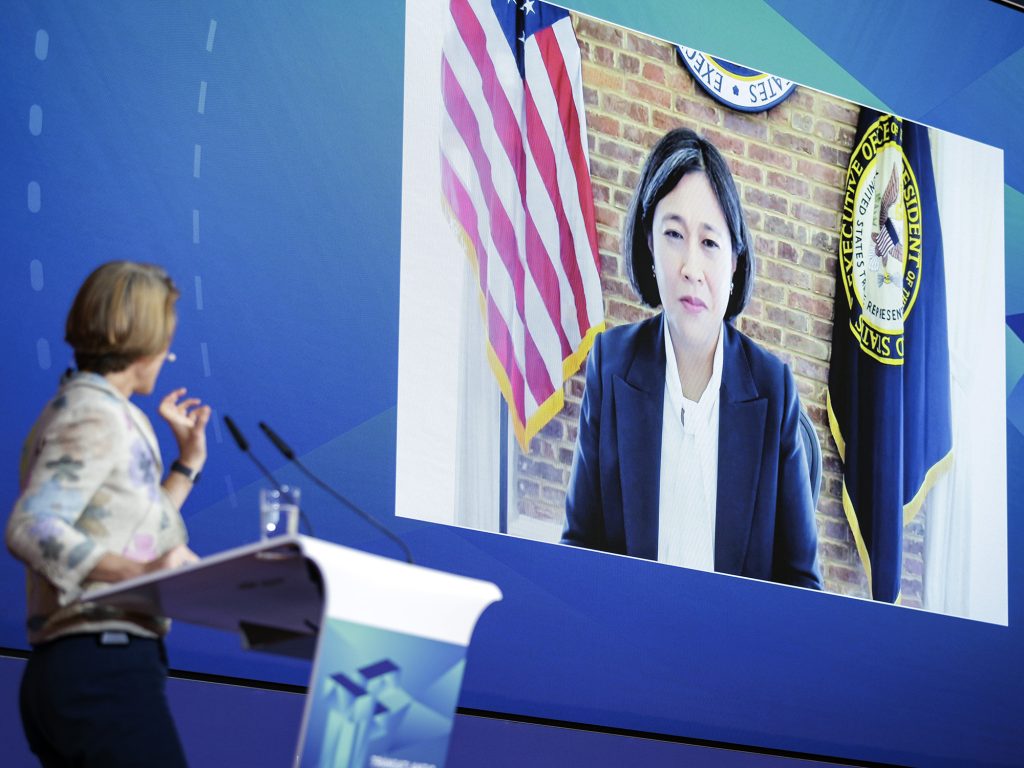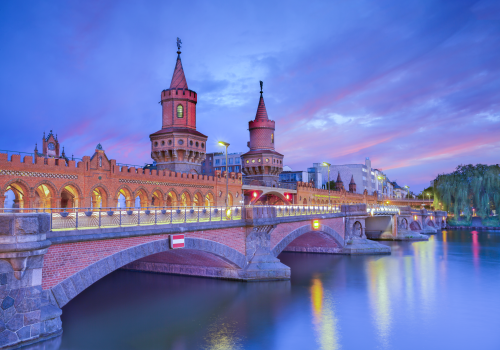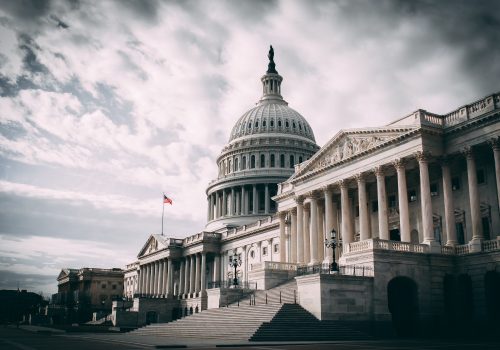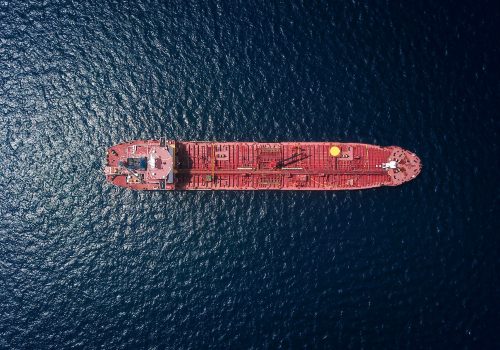Watch the event
Event transcript
Uncorrected transcript: Check against delivery
Speaker
Katherine Tai
US Trade Representative
Moderator
Stephanie Flanders
Senior Executive Editor for Economics; Head, Bloomberg News; Bloomberg Economics
STEPHANIE FLANDERS: You use words like homestretch when you’re just trying to get people to stay in the room, but I think we’ve got the perfect speaker to get people to stay in the room. And I can assure you that your advisor, Beth, has already done you proud in the preceding session. I don’t think she made too much new policy though, obviously, my colleagues will be examining everything she said.
We’ve had an, I think, admirable mix of high-blown rhetoric and very existential discussion today, but also concrete specifics. And I hope that we’re all fine with sort of continuing that with this session, because obviously your life is a lot about concrete specifics and ongoing arrangements, as well as the big picture, which I know we’ll get to. So I will ask you a little bit about some of the sort of things in your in-tray, but I think that could also lead us quite nicely into some of these broader discussions.
So I guess the obvious one to start with is the Trump-era Section 301 tariffs on China. You’ve been reviewing the necessity of those for a year. Have you decided?
KATHERINE TAI: Well, it’s wonderful to see you, Stephanie. And it’s delightful to be with all of you. And I know that—I was looking at the schedule, and I think you and I, and maybe a short closing session, are what separates the audience from a reception and beverages. So it’s always a tough place to be in the agenda.
But to start with your question, a year ago, under our statute, we were asked to begin a process to evaluate not the necessity of the tariffs, but the effectiveness of the tariffs. It’s important to be really specific about the statutory requirements, because we’ve got to follow the law. And so we began that just about a year ago. We are engaging in a very robust interagency process. We requested comments from the public across our economy. We had an open public comment period that closed earlier this year. That generated about 1,500 comments that we are going through very carefully. I’ve been asked—we call it the four-year review. I’ve been asked whether that’s because it will last four years. The answer is no. It’s the four-year review because it happened—it was triggered at the four-year mark of the tariffs.
I want to convey to the audience, and to all who are interested in this, that the Biden administration takes the management of the US-China relationship extremely seriously. It is one of our most profound responsibilities in terms of managing not just our economy, but the world economy, in terms of how we are relating to each other as the two largest economies in the world. And so we are making sure to take our time, to be very deliberate, and to be extremely thoughtful about how we can rebalance the trading relationship between these two largest economies in the world to achieve more fairness and to achieve more effectiveness in defending our economic interests.
And I think at the core of this exercise is a recognition that the US and the Chinese economies, for their size and their weight and significance in the world economy, that we’re two economies that are very structurally different, that are based on very different philosophical underpinnings. And so the issue of how we can achieve a coexistence that can be productive and constructive for the world is not an easy question. And I don’t think the answers are easy either. But in terms of this particular tariff review, it is a part of the larger exercise that we are bringing to management of this relationship.
STEPHANIE FLANDERS: But, as you pointed out, you’ve been—you closed the comments period in January. So I guess that’s eight months. I mean, can we expect any action on this, you know, in the near-ish future? Or is this something that’s going to push a long way ahead?
KATHERINE TAI: Well, our goal is to wrap this up hopefully by the end of this year.
STEPHANIE FLANDERS: OK. And you talked about the broader relationship. We obviously also measure the relationship in part—maybe we shouldn’t—but by visits and shakings of hands and meetings. We’ve had—Secretary Raimondo and others from the administration have now been to China. Are you expecting to go to China in the near future? How do you see the relationship at that level, the sort of personal relationship?
KATHERINE TAI: So I’ll go back to the way you framed your question, because I think it was quite telling, whether or not we should be measuring the relationship in terms of the numbers of visits or who’s going where. I think that the—what we’re trying to get at and the most important element is whether or not we are communicating and, given the challenges between us, whether or not we are able to promote a better understanding of each other. So I think it’s less about the active visiting and more about the substance of the engagement. And on that, I have from the very beginning of my time indicated and stood by my openness to engage with my counterparts in Beijing. Since the last changeover in President Xi’s team last fall, I’ve not yet had a chance to meet the new vice premier, but we have indicated through all of our channels and openness and an eagerness to meet to continue the process of deepening the understanding between us, especially around the areas where our economies are encountering friction and incompatibility.
STEPHANIE FLANDERS: You probably need to seize your moment because the lineup might change any minute; it’s been changing every few months.
Closer to home, your team reminded me when we were discussing this session that you’re only a month away from the US and the EU potentially reimposing tariffs on each other, having not reached a deal on the clean steel talks. So could you just let us know briefly how those are going?
KATHERINE TAI: Certainly. Let me review the facts there a little bit, too, and a bit of the history. So when we came in in this administration at the beginning of 2021, the transatlantic relationship was under quite a bit of stress, and in response to the global steel and aluminum tariffs that had been applied in 2018, Europe applied on a large amount of US trade going to Europe retaliatory tariffs.
Now, what we did in October of 2021 was to call a truce with Europe. We converted the tariffs to what we call tariff-rate quotas. That allowed for us to resume duty-free trade in steel and aluminum from Europe with guardrails. If they hit certain limits that exceed historical quantities, tariffs outside of those volumes would kick back in. In the meantime, Europe suspended its retaliatory tariffs.
Now, we programmed those tariff factions on both sides to expire at the end of 2023 if we did not come up with a new arrangement between the US and the EU by the end of October. And that’s the deadline that we’re working towards, October 31, 2023. We gave ourselves two years to negotiate something where the US and the EU could put ourselves on footing where we could be linking arms to take on the overall challenge of overproduction, overcapacity in steel and aluminum in the global marketplace that is impacting our producers, our workers in similar ways because we both have what we consider to be market-based production, production that is exposed to market forces, that is responding to market forces like demand, and that this overproduction in the global marketplace is based on nonmarket forces. So we are nearing the deadline and we have been doing a lot of work in terms of aligning our systems.
The two challenges that we are trying to solve for together, on a US-EU basis, are, first, the global market distortions and the negative impacts to our producers that come from nonmarket excess production and capacity—so, unfair trade. The other challenge that we are linking arms to address is the need for a clean energy and industrial future, and so the other pieces of what we’ve been doing is trying to figure out how to align our markets to create incentives for cleaner production.
If you are producing as cleanly as we are based on our metrics and our data then the concept is that you will have easier access into our markets, just creating incentives for clean trade and clean production. The more fairly you are producing your steel and aluminum, again, the more we treat you the way that we will be treating each other and this is the basis for what we’ve been working towards, what we’ve been calling a global sustainable steel and aluminum arrangement.
So that our vision is that once the US and the EU can agree that we then bring in other like-minded parties and we try to create a paradigm—to your point about changing the paradigms of trade, we try to create a paradigm for trade that is going to raise standards over time, that is going to incentivize fair production and fair trade based on market principles, and also clean production and clean trade.
So this is one of the most consequential engagements and negotiations that we are engaged in, one of the most important between the US and the EU, and I remain very hopeful that we will have something to show the rest of the world in the next six-week period.
STEPHANIE FLANDERS: Are you sort of dead set on introducing a tariff even if it’s unilateral on what you might call dirty steel, a sort of US version of the carbon border adjustment mechanism because that—you’ve highlighted that that sort of mechanism would be part of the deal you’re looking for but it goes beyond Europe.
KATHERINE TAI: So just push back a little bit on the way you framed your question, am I dead set. I am very determined for the United States to be able to work with the EU as partners jointly to address the challenges that we face in the changing global economic situation and those have to do with fair trade, market-based production, and also carbon intensity.
So let me just bring it back down to the principles of what we’re trying to accomplish and, yes, we are very, very committed to being able to do this with Europe.
STEPHANIE FLANDERS: The way that you’ve wanted to do it and I think the issue has been for the EU, and I think Vice President Dombrovskis have made it clear, is that what you’re looking for seems to go against WTO rules because you will be discriminating against a certain number of countries, and you don’t have a similar mechanism that the EU has for—that applies to its own companies.
So I think this gets us to one of the discussions that we’ve had all through the day. There’s a sort of disquiet in Europe with a US policy which seems to undermine the concept of a global rule-based order and I just—there’s even a feeling that you can’t do all the things that you’re talking about within the WTO or even within the spirit of the WTO. Is that fair?
KATHERINE TAI: That’s absolutely not fair, and you know that I’m going to say that. So thank you for that setup.
STEPHANIE FLANDERS: Well, tell us why not.
KATHERINE TAI: I appreciate the opportunity to explain the US point of view because I know that Brussels has been very effective in transmitting its side of the story. And do keep in mind that we are still at the table negotiating constructively so that—and the public versions of what you’re hearing is for a public audience. But we have a very good partnership still in terms of the negotiations themselves.
What I want to really emphasize is I really bristle at this narrative that the United States would put forward a proposal that is WTO inconsistent because that calls into question our good faith in engagement and our good faith as a WTO member.
Let me put it to you this way because I think that we talk a lot about the WTO and many people talk about the WTO. Not a lot of people have been to the WTO, participated at the WTO, or represented their governments at the WTO.
The fact of the matter is that there is no WTO rabbi who sits and pronounces whether or not a measure that is being advanced by a WTO member is kosher or not. I think that when we put forward measures, we all try to ensure that we are working within the rules-based order.
In fact, I know that the Europeans are very, very proud of their carbon border adjustment mechanism. And that it is the culmination of a lot of European-based work, and compromise, and negotiations. But I also want to acknowledge and recognize that Europe’s confidence that the CBAM is WTO consistent is indicative of the work that Europe has put in to design this system. And Europe’s confidence in terms of how it will defend the CBAM if challenged at the WTO—and we all know that there are members of the WTO right now who are looking and preparing to challenge the CBM at the WTO. So whether or not you feel confident about the work you’ve done to design your system doesn’t mean that it’s not going to be challenged, or you wouldn’t have to defend it.
And so I give you that background because I want to emphasize and make clear that the proposals that we have put on the table and shared with Brussels are ones that we also feel we have designed to withstand WTO scrutiny, that we have our reasons for believing that we have abided by the WTO rules. At the end of the day, in our negotiations it became very clear that our levels of tolerance or our comfort level with different types of defenses are different on a Washington and Brussels basis. And that’s very natural. We have adapted in the negotiations, as you must in negotiations, to try to come towards Europe in terms of its WTO argumentation and defense comfort.
And I want to make sure to share that with all of you because that is something that we do not get credit for. That I want you to know that we don’t just sit at a negotiating table and pound the table and say you must do this, because we do know how to negotiate. We have successfully negotiated agreements with the EU. And we do intend to land this negotiation on a Washington-Brussels basis, and soon.
STEPHANIE FLANDERS: Well, you’ve made me wish even more than I was in the room in some of these negotiations, because it must be really good fun being in negotiation with you. I’m sure if there was—if there was actually—if there was actually a WTO rabbi, I’m fairly sure that the transatlantic council would have somehow got them on the stage here. But, unfortunately, there isn’t.
I can’t help asking, given what you’ve just said—changing the subject a little—what was your response when you heard, probably a fair bit ahead of the rest of us, that the EU was going to launch its probe into the subsidies of Chinese electrical vehicles, given how much high-blown rhetoric we have heard from the European Union on free trade and other things?
KATHERINE TAI: What was my response? I don’t know. I think—I don’t know that I heard it—
STEPHANIE FLANDERS: Well, what did you think about it?
KATHERINE TAI: I don’t know that I heard it much in advance of everyone else. I’m quite sympathetic to the announcement, really, because at the end of the day, as a policymaker—an economic policy maker in a democracy—your responsibility is to the livelihoods of your citizens and your workers, and your ability to grow your industries. This is true for us in the United States. It’s true for Europe. I know you’ve got a more complicated structure in terms of the member states and the Commission. But if you look at the facts, and you look at the data on the ground, and you look at the electric vehicle industry and the competition, and you look at how this industry has grown in China, it is—it is echoing all of the dynamics that we have seen from industry to industry, that—where we have been under incredible pressure to continue to compete from our standpoint of having market-based economies.
And it underpins the dynamics that we have with steel and aluminum that have led us to a point where we were launching tariffs against each other before we could try to figure out a place and an opportunity to—on how we work together on a challenge that is putting pressure on both of us. We have experienced it with solar panels, were twenty years ago we both—the US, the EU, also Canada—had burgeoning solar-production industries that we have mostly lost, by the way. And we see the same thing happening with electric vehicles.
So I think that what I see is, in so many ways—and this is one of the ways in which the EU is waking up to the fact that global trade today is not happening on a level playing field, and therefore there are things that we market-based democratic economies need to do in order to defend, to defend our interests and to defend the space to have fair and free trade.
And I think that that is one of the most important aspects of this coming to terms with today’s global realities is so many things happened in these past couple of years, whether it’s the supply-chain shocks that came from the pandemic and the discombobulation of the shipping and the logistics around supply chains too; Russia’s invasion of Ukraine.
I just want to recall that not even that many years ago the accepted wisdom was two countries that had McDonald’ses would never go to war with each other. But just a year and a half ago we saw that, despite the fact that there had been many McDonald’ses in Russia and in Ukraine, that that didn’t stop Vladimir Putin from making the decision to invade Ukraine.
And so for many, many reasons, it is incumbent on us, especially on a transatlantic basis, but across the world, to open our eyes and to look at how the world trading system is functioning. Compare the reality that we are experiencing today to the foundational goals that we set out for ourselves fifty, sixty, seventy, eighty years ago, and try to figure out how we can accomplish what I believe are still valid and legitimate goals from a long time ago, but to correct for the distortions and the losing our way that has happened over time.
And this also gives me an opportunity—Stephanie, I hope you’ll indulge me—to pitch my speech on WTO reform and my remarks with Director General Ngozi a little bit later today here in Washington.
STEPHANIE FLANDERS: OK. Heard it here first.
Just very briefly on that, just on the—because I’m trying to tease out where we’re going on this—if you have a finding from the EU against China and it ends up in quite a costly amount of retaliation, tariffs on Chinese electric vehicles, retaliation by China, which obviously many in Germany are fearful of, does that serve the kind of objectives that you’re seeking when you talk about trying to build a sort of fairer global trading system to have that kind of all-out trade dispute?
KATHERINE TAI: Well, let me unpack your question, because let’s be very clear. The countervailing-duty investigation, and potentially countervailing-duty actions, are allowed expressly under WTO rules. The WTO recognizes that not all trade is fair necessarily, and we are allowed trade-defense instruments that are, as you call them in the EU, and what we call trade remedies, all WTO members are allowed trade remedies to correct for unfair trade, whether it takes the form of dumping illegal subsidies or when they’re combined. They can be very harmful to your industrial and your worker and societal growth.
So from where I sit in terms of tracking announcements from the EU, the EU was well within its rights, as we all are, to launch a countervailing-duty investigation. I think I did hear a bit of Denis’ interventions earlier. They will have to allow those investigations to run. And then, based on the findings of those investigations, if they do apply countervailing duties, they will be calculated to address the unfairness and the gap in terms of the harm. And should there be retaliation, that retaliation should be based in WTO rules or that retaliation is illegal.
And I also heard Denis talk about economic coercion. So I think it’s not wrong to anticipate that there may be economic consequences that are inflicted. But just to reflect again, that that is not the way that the world trading rules are supposed to work. So appreciate your question, because I think that it really highlights some of the fundamental values that are baked into the World Trade Organization, and how far our reality has deviated from the way that we tried to design the system.
STEPHANIE FLANDERS: I want to tick off a couple more things, because you’ve said that the emphasis—you’ve often said in numerous speeches—the emphasis of your policy at the moment and what you consider to be your job is not ticking off trade agreements, reducing tariffs, but a much broader concept of resilience in our—in trade relations and broader relationships. The Indo-Pacific Economic Framework was one example of that. About a year ago started the—started the negotiations on that. Just can we expect to see something at the APEC meeting? Just wondering how that’s—how that’s going.
KATHERINE TAI: No, I think you absolutely should expect to see. We are looking forward to, again, unveiling and demonstrating the progress that we’ve accomplished in this fourteen-country group, about half the size of the EU. We’re not trying to accomplish the same things as the EU, but just to—just to demonstrate that it’s a multiparty cooperative effort that we have gotten underway. The entire framework effort was launched by our leaders in May of 2022. That’s just over a year ago.
We just hit, and just passed, our one-year anniversary of convening the first meeting of economic and trade ministers. We did that in September of 2022, at the beginning of September in Los Angeles. And in just the last twelve months, and by November will be fourteen months, I’m looking forward to sharing with everyone what we’ve accomplished, keeping in mind how challenging multiparty exercises are. And that in the world of trade negotiations in particular, twelve to fourteen months is a very short amount of time. I think I would very much look forward to demonstrating how much we have done in a very short period of time.
It is more than just showing off. In that we actually have—
STEPHANIE FLANDERS: And there’s a trade pillar?
KATHERINE TAI:—demonstrating how quickly we need to find ways to collaborate, to come together, to innovate together in a global economy where changes are not waiting for massive single undertakings and years-long trade negotiations. That what we are doing is finding ways to work together with likeminded partners to figure out how we can unlock and use the tools of trade and economic principles to promote, not just resilience—I know that there’s a huge focus on resilience—but also sustainability and, equally importantly, inclusivity in the outcomes of our economic cooperation. Because all of those are dynamics and challenges that we all face in the current global economic climate.
STEPHANIE FLANDERS: And there’s a trade pillar to that?
KATHERINE TAI: There are four pillars. There’s a trade pillar. There’s a supply chain pillar.
STEPHANIE FLANDERS: Yes. How is the trade pillar going?
KATHERINE TAI: It’s going well. We’re making a lot of progress.
STEPHANIE FLANDERS: OK. We got a couple of minutes for question. I know that there might well be a question in the audience. I don’t have the iPad side, so can’t get the questions from outside. But I didn’t get any this morning, so does anyone have a question for the ambassador? I will ask you—oh, yes. OK, well, just wait for the mic.
NOAH BARKIN: Hi. Noah Barkin from Rhodium Group and German Marshall Fund.
I’m just curious for your thoughts, Ms. Tai, on the TTC and the future of the TTC. How is it going? Do you see a bright future for it? Do changes need to be made? Thank you.
KATHERINE TAI: Thank you for that question. It’s wonderful. It would be—it would be wrong to wrap this up without talking about the TTC, so I’m very glad for that prompt.
We are looking to host TTC five sometime this fall. I’m also looking forward to that. I think, you know, trade negotiators and, you know, demanding bosses, we like to be critical about how we can do things better. But I think that the TTC has been incredibly successful and it’s incredibly valuable.
We set this up—President Biden and President von der Leyen announced the start of the TTC effort in June of 2021, and we hosted our first TTC in Pittsburgh almost exactly two years ago. When we set it up, it was really to create a forum for collaboration, cooperation, incubation, and innovation of new ideas to address how we can align better in responding to trade and technology challenges that we are facing.
It was—I think the value of the TTC was demonstrated very, very clearly when Russia invaded Ukraine and this structure of communication and relationships that we had built through the TTC—and I think at that point we’d only met once—immediately facilitated the ability for the US and the EU to coordinate response on the economic side to the Russian invasion of Ukraine. And ever since then, I think that the robust work that’s happening across ten working groups, could it be streamlined? Possibly. Can we improve it? I’m sure. But I’m really delighted and looking forward to hosting the next TTC because I think that it’s already demonstrated its value. And with all of the challenges that we continue to face, I expect it to continue to serve a great deal of our transatlantic interests.
STEPHANIE FLANDERS: And just a final question, Ambassador, before we let you go. I was very struck one of your predecessors, Michael Froman, said to me earlier this year in an interview that looking back on when China joined the WTO that we had this anticipation that China would become more like us, and instead we have become more like them—focus on subsidies, playing one country against another, state-directed investments in different sectors. Do you think that’s a fair observation?
KATHERINE TAI: Well, Mike Froman is a good friend of mine, and I think that one of the benefits of not being US trade representative anymore, and perhaps he was in his CFR identity when you had the chance to talk to him. I don’t think that’s fair—in particular the second part, that we are becoming more like China.
I think, again, you have to recognize that the global economy, the terms of competition have changed, and we need to adapt. We’re not trying to embrace the Chinese model; we’re trying to embrace a model that stays true to our market orientation, to our democratic principles, that is going to allow us to compete in a global economy that is very, very different, truly, than it was just twenty short years ago. And we are doing it on an EU and US basis.
The key is that we have to stay true to our principles because, at the end of the day, what we value most is our democratic freedoms and, frankly, our economic freedoms and our opportunities. And that is something that underlies everything that we are doing today, and that hasn’t changed.
STEPHANIE FLANDERS: Ambassador Katherine Tai, thank you very much.
Watch the event
Further reading
Wed, Sep 20, 2023
The US, EU, and UK need a shared approach to economic statecraft. Here’s where to start.
Report By
The economic statecraft landscape is becoming more complex as transatlantic partners increasingly leverage the tools to counter transnational threats. There is a growing need to understand how these tools are used, by whom, and when, as well as their intended and real impacts worldwide.
Mon, Aug 7, 2023
A year after the IRA, industrial policy has gone global. Now what?
EnergySource By David L. Goldwyn, Andrea Clabough
The domestic impacts of the IRA are undeniable. It is less certain what it means for the global energy transition. One year later, officials must prioritize opportunities to align with like-minded allies overseas.
Mon, Aug 14, 2023
The IRA is strengthening the United States as a low-emission oil and gas superpower
EnergySource By Joseph Webster
The lRA not only strengthens US leadership in global decarbonization efforts—it also makes the United States an even more powerful actor in oil and gas geopolitics.
Image: US Trade Representative Katherine Tai speaks at the Transatlantic Forum on GeoEconomics in Berlin on September 22, 2023.




